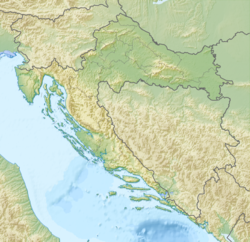Rijeka Synagogue
| Rijeka Synagogue | |
|---|---|
Croatian: Riječka sinagoga | |
 An undated image of the former synagogue | |
| Religion | |
| Affiliation | Neolog Judaism (former) |
| Rite | Nusach Ashkenaz |
| Ecclesiastical or organisational status | Synagogue (1903–1944) |
| Status | Destroyed |
| Location | |
| Location | Rijeka, Primorje-Gorski Kotar County |
| Country | Croatia |
Location of the destroyed synagogue in Croatia | |
| Geographic coordinates | 45°19′37″N 14°26′31″E / 45.32699°N 14.44202°E |
| Architecture | |
| Architect(s) | Lipót Baumhorn |
| Type | Synagogue architecture |
| Style | Art Nouveau |
| Date established | September 26, 1781 (as a congregation) |
| Completed | 1903 |
| Destroyed | January 25, 1944 |
| Materials | Red brick |
| [1][2] | |
The Rijeka Synagogue (Croatian: Riječka sinagoga), also called the Great Synagogue of Rijeka, was a former Neolog[1] Jewish synagogue, located in Rijeka, Croatia. Completed in 1903, the synagogue served as the main synagogue of the city until it was destroyed by Nazis in 1944.[2][3]
History[edit]
The first Jews settled in Rijeka from the Italian Adriatic coast in the 15th century. The Jewish community of Rijeka was established on September 26, 1781. The first Rijeka synagogue was located in a three-storey house. In 1901, the Jewish community of Rijeka had 2,600 members.
The Jewish community of Rijeka collected voluntary contributions for the construction of the synagogue. Construction began in 1902 at Via del Pomerio 31, and it was finished on September 18, 1903. The new synagogue was opened on the holiday of the Jewish New Year, Rosh Hashanah, October 22, 1903.[3][4]
The synagogue was a square-layout tower with a cupola above the shrine and two smaller cupolas at the entrance façade. Red façade brick was used for decoration, while the façade was emphasized with white horizontal lines and small relief architectural decorations. Large openings of pointy arched three-light mullioned windows were prominent on the façade.[5] The interior of the synagogue was built in the Mudéjar style.
After German retreat from the area of Rijeka, the building was set on fire on January 25, 1944,[3][4] and the price of its restoration was too high so the remains of the damaged synagogue were sold as construction material. Today at the site of the grandiose synagogue there is an inscription describing the former building.[5]
The Rijeka Orthodox Synagogue, a much smaller and Orthodox synagogue, served as the synagogue for both congregations following the destruction of the Great Synagogue. The Rijeka Orthodox Synagogue was completed in 1931 in the Rationalist style, and is one of the very few Croatian synagogues that survived the destruction of the Nazi period.[5]
Gallery[edit]
-
Original building
See also[edit]
References[edit]
- ^ a b Wilkinson, C. J. (December 13, 2021). "Conjuring Ghosts – Jewish Rijeka: A Sense of the Invisible (Traveling The Croatian Coastline #43)". History of Rijeka: Europe Between East And West. C. J Wilkinson. Retrieved May 19, 2024.
- ^ a b Wilkinson, C. J. (December 17, 2021). "Staring Into The Abyss – Neolog Synagogue of Rijeka: A Spiritual Void (Traveling The Croatian Coastline #44)". History of Rijeka: Europe Between East And West. C. J Wilkinson. Retrieved May 19, 2024.
- ^ a b c Morgani, Teodoro (2006). Židovi Rijeke i Opatije (1441.-1945.) (in Croatian). Rijeka: Adamić d.o.o., Židovska općina Rijeka. ISBN 978-953-219-323-7.
- ^ a b Starčević, Irena Deže (June 2011). Židovska općina Rijeka (in Croatian). Židovi u Rijeci. pp. 4, 8, 10, 18–20.
- ^ a b c "Synagogue". Rijeka Heritage. Rijecke Industrije. March 27, 2008.
External links[edit]
 Media related to Great Synagogue of Rijeka at Wikimedia Commons
Media related to Great Synagogue of Rijeka at Wikimedia Commons
- 1780s establishments in Croatia
- 20th-century synagogues in Europe
- Ashkenazi Jewish culture in Croatia
- Ashkenazi synagogues
- Buildings and structures destroyed during World War II
- Destroyed synagogues in Croatia
- Buildings and structures in Rijeka
- Buildings and structures demolished in 1944
- Culture in Rijeka
- Jewish organizations established in 1781
- Neolog Judaism synagogues
- Synagogue buildings with domes
- Synagogues completed in 1903
- Synagogues destroyed by Nazi Germany
- 1944 disestablishments in Europe
- 1940s disestablishments in Croatia
- European synagogue stubs
- Croatian building and structure stubs



